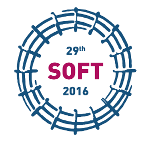Speaker
Vaclav Dostal
(Energy engineering)
Description
The cooling system is one of the key parts of the fusion power reactor technology. The DEMO fusion power reactor should have different heat sources (first wall, blanket, and divertor) with different temperature and power. In the current European concept of DEMO, helium and water are used as the cooling medium. However, use of Helium and water introduces some issues in terms of their properties and also in the design of the systems. A possible alternative is the supercritical carbon dioxide (S-CO2) cooling system. This paper focuses on the application of S-CO2 for the fusion power reactor. In the first part the design of cooling system with S-CO2 for primary circuit is completed and compared with the existing options. Then the design of the S-CO2 loop for secondary circuit is researched with different medium on the primary side (water, helium and S-CO2). Last part of this paper is focused on the study of the S-CO2 thermal cycle and efficiency estimation. The reason for research of the cooling systems with S-CO2 for the fusion power reactor is because the compression work of S-CO2 is lower than with He and also because S-CO2 cycle components are more compact than both steam Rankine cycle and helium Brayton cycle. The heat addition into a thermal cycle from different heat sources with different temperatures is generally disadvantageous in terms of efficiency of Rankine-Clausius and helium cycle. However, this is actually advantageous for the S-CO2 cycle as it resolves the real S-CO2 property issues. S-CO2 is thus an attractive option for heat removal as well as conversion of heat into energy and might have overall better performance than steam Rankine-Clausis or helium Brayton cycles. Therefore, it should be considered as an option for the DEMO fusion power reactor.
Co-authors
Ladislav Vesely
(Energy engineering, Czech Technical University In Prague, Prague, Czech Republic)
Slavomir Entler
(Institute of Plasma Physics, Czech Academy of Sciencies, Za Slovankou 3, 182 00 Prague 8, Czech Republic)
Vaclav Dostal
(Energy engineering, Czech Technical University In Prague, Prague, Czech Republic)

